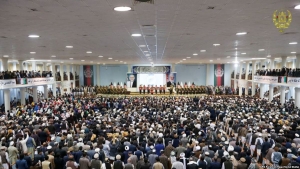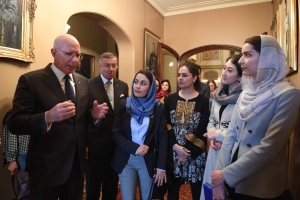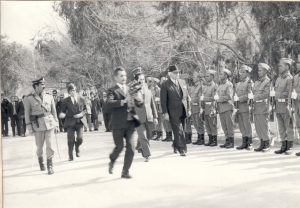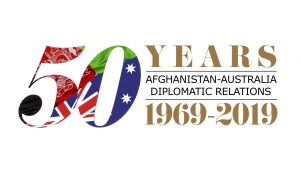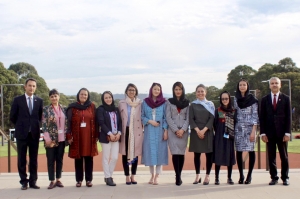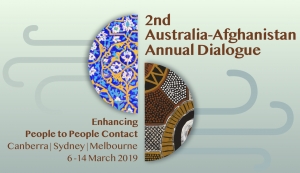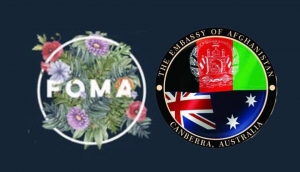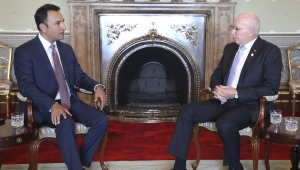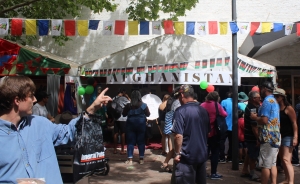April 29 – May 2, 2019 (9 – 13 Saur 1398)
In the Name of God, the Merciful
Inspired by the holy verse 42:38, [And whose affair is determined by consultation among themselves.] and convened by Presidential Decree Number 162 dated 11/03/2019 (20/12/1397), we the 3,200 members of the Consultative Peace Loya Jirga, composed of women and men, elected representatives of the nation in the houses of Parliament, members of the ulema, religious scholars, influential personalities, tribal elders, members of provincial councils, members of the High Peace Council, representatives from civil society and social organizations, representatives of women, the private sector, scientific institutions, academics, writers and poets, artists, national and civic institutions, the youth, members of the media, members of the bar and the association of defense lawyers, registered political parties, athletes, persons with disabilities caused by conflict, families pf security and defence forces victims, families of the victims of the conflict, members of the Helmand Peace March, representatives of refugees living in Iran and Pakistan, representatives from Afghan experts in the Diaspora, Kuchis, Hindus and Sikhs, and other persons of influence and expertise from every strata of society, gathered for five days from 29 April to 3 May 2019 (9-13 Saur 1398) to consult on the meaning of peace, define a framework for, and set limits on, peace negotiations between the Taliban Movement and relevant parties in the Afghanistan peace process.
We the members of the Consultative Peace Loya Jirga, representing the honourable and noble people of Afghanistan, who have endured many years of war and bloodshed, poverty, deprivation, migration, and displacement: with consideration for their religious and national obligations, the vital need of the Afghan people for peace, and the knowledge that an end to the conflict alone does not achieve a dignified and lasting peace. It requires the safeguarding of national interests, economic and social development, poverty alleviation, political stability and regional and international consensus. We pay tribute to the determination, forbearance, patience and sacrifices of the great nation of Afghanistan, especially the security and defence forces, to achieve lasting peace and prosperity for all. We appreciate the initiative of the government of the Islamic Republic of Afghanistan to consult the nation about ending the war and bloodshed and achieving lasting peace. We salute the efforts of the international community to bring peace to Afghanistan. We reaffirm a commitment to Islamic principles, national values, jihad, and resistance; as well as the safeguarding of national sovereignty and territorial integrity. We have come together to bring messages of peace to the relevant parties involved in the Afghanistan peace process.
We, members of the Consultative Peace Loya Jirga, having deliberated the issues outlined in the agenda items set by the fifty working committees and having held comprehensive discussions in the general session, concur on the following points:
- We, the participants of this Jirga, are determined and committed to bring durable peace to the country.
- Members of the Consultative Peace Loya Jirga call on the Taliban Movement to, considering the adverse consequences of war and bloodshed, heed the voice of this great gathering of people who represent every corner of Afghanistan, end their animosity, and participate in the development and prosperity of their homeland. There are no winners in war and are there any losers in peace.
- One of the main drivers of conflict in Afghanistan is diverse and varied readings and interpretations of Islam. Members of the Consultative Peace Jirga recommends that the government, the Taliban Movement and religious scholars unify their interpretation of Islam and be the catalysts for national unity and consensus.
- The government of the Islamic Republic of Afghanistan and the Taliban Movement must submit to the voice of the outright majority of Afghans and declare an immediate and permanent ceasefire to take effect across the country on the first day of the holy month of Ramadan in the current year; in order to respect the will of the people, honor the holy month of Ramadan, end violence and build trust among the parties, and cease negative propaganda.
- The Islamic Republic system is the great achievement of the people of Afghanistan and the result of many years of sacrifice and struggle [Mujahedat] . Establishing and strengthening peace in Afghanistan must upholf the integrity of the system (Islamic Republic of Afghanistan) through direct negotiations.
- The current constitution of Afghanistan is a national and valuable guarantee to the Afghan people, which should be preserved; but, after a peace agreement, if necessary, amendments to some of its articles are possible through appropriate and principled mechanisms.
- The fundamental rights of citizens as enshrined in the constitution of Afghanistan, including the rights of women and children, the right to political and civil participation, the right to freedom of expression, the right to education and employment, the right to access public services as well as the rights of ethnic and religious minorities, persons with disabilities, heirs of martyrs, must be preserved and strengthened as part of the peace process.
- The security and defence forces are the country’s pride. Consolidating and sustaining lasting peace requires strong national security and defence institutions. Therefore, the people of Afghanistan, through this jirga, emphasize the preservation and strengthening of these institutions.
- Members of the Consultative Peace Loya Jirga request the parties and the countries involved in the Afghan peace process to pave the way for the opening of a Taliban political office in Afghanistan through mutual understanding and cooperation.
- Members of the Consultative Peace Loya Jirga call on the government of Afghanistan to preserve the values and achievements of the past two decades and in close coordination with the international community and after consensus among all parties to the peace process, prepare a feasible timetable for the responsible withdrawal of foreign forces from Afghanistan.
- Members of the Consultative Peace Loya Jirga call on the government of Afghanistan, all political parties and currents as well as influential national personalities, during this historic and decisive time, to use the present opportunities and for creating a national and domestic political consensus to advance the peace process and enter into peace negotiations from a unified and Afghanistan-wide position.
- All the involved parties should limit and refrain from [imposing] preconditions that constrain the ground for the commencement of direct negotiations.
- All parties must act in the spirit of Islam and ensure the good treatment of captives and prisoners of the other side. They must use flexible and constructive approaches to the exchange of captives and prisoners, and make greater efforts to build trust and demonstrate goodwill between the two parties.
- To achieve durable peace, regional and international consensus is imperative and vital. Therefore, members of the Consultative Peace Loya Jirga call on regional and trans-regional countries and the international community to coordinate their efforts to establish peace in Afghanistan with the government and put the government of the Islamic Republic of Afghanistan at the centre of their initiatives and efforts.
- Members of the Consultative Peace Loya Jirga call on the government to emphasise, in all negotiations and talks, a policy of good neighbourliness with neighbours and the countries of the region. If there is persistent interference in the affairs of Afghanistan by countries in the regions or some of the neighbours, [the government must] lodge a formal complaint of behalf of the people of Afghanistan with the United Nations Security Council.
- The government must, in consultation with influential national, political and social addresses, develop a comprehensive and all-inclusive plan to accelerate the peace process, begin direct negotiations with the Taliban Movement, and should consider and implement the consultative guidance of this jirga.
- Realising the urgent need for an impartial body to facilitate the peace process, members of this jirga recognise that, in order to make the High Peace Council transparent and effective, fundamental reforms should be made to the structure, organisation, and performance of the Council.
- Members of the Consultative Peace Loya Jirga, considering experiences of the past, advise that the negotiating team be formed of jihadi personalities, persons who are nationalist, expert, experienced, of good repute, committed to human rights values and peace-seeking. The composition should be manageable (maximum 50 people), consider the ethnic balance, and include the learned ulema, tribal elders, women, the youth, families of victims, people with disabilities, minorities, representatives of civil society, refugees, the media, Kuchis, representatives from different classes and strata of the society, as well as some members of the Consultative Peace Loya Jirga.
- Members of the Consultative Peace Loya Jirga ask the government of the Islamic Republic of Afghanistan to facilitate and accelerate the peace process, identify the legitimate and reasonable requests and demands of the Taliban and take necessary actions in their regard for further confidence building.
- Members of the Consultative Peace Loya Jirga, will be messengers of peace and will carry this Jirga’s message of peace to their people and communities upon return to their localities; and will begin comprehensive efforts in cooperation with local administrations, ulema, tribal elders, the youth and women, so that we can play our religion and national part in the ensuring peace.
- Members of the Consultative Peace Loya Jirga call on the government to maintain its relations with members of this jirga, with influential institutions and continuously inform members of the jirga on the implementation of the jirga’s advice as well as the progress of peace talks and negotiations.
- Members of the Consultative Peace Loya Jirga, emphasising the articles of this resolution, address the government of the Islamic Republic of Afghanistan, the Islamic Movement of the Taliban, the International community, regional countries and other parties involved to respect the rightful requests and demands of the people of Afghanistan, the advice of this historic Loya Jirga, make serious and sincere efforts, take practical steps to establish and consolidate a durable peace, and prevent the protraction and intensification of the conflictr and [continuing] civilian casualties.
- Members of the Consultative Peace Loya Jirga, due to the significance of this historic Loya jirga, call on the Chair and Administrative Board of the Consultative Peace Loya Jirga to publish and disseminate all the views, opinions and recommendations of the fifty committees in an official document.
May Allah give us success
Members of the Consultative Peace Loya Jirga
Loya Jirga Hall
Kabul-Afghanistan
2019 marks the 50th Anniversary of the establishment of bilateral relations between Afghanistan and Australia, and as part of this we commemorate the important milestones throughout these 50 years. One such milestone was the first official visit to Afghanistan by His Excellency the Honourable Sir John Kerr. The Hon John Kerr acted as the 18th Governor-General of Australia between 1974 and 1977, and his 1975 visit to Afghanistan was the first by any Head of State since Afghanistan’s President Mohammad Daoud assumed power in 1973. This landmark visit, in the spirit of cooperation between Australia and Afghanistan, saw Sir John Kerr meet with the President and Prime Minister, Mohammad Daoud and Deputy Prime Minister, Mohammad Hassan Sharaq. Discussions were also hosted by the Minister of Commerce, Deputy Foreign Minister, the Governors of Kabul and Balkh provinces, amongst others. John Kerr identified each of these meetings as an important opportunity to strengthen the bilateral ties between the two countries. The visit highlighted the contributions of Afghan students in Australia, shared experiences as agricultural nations, as well as many other mutually beneficial connections – each of these factors was seen as significant in nurturing the bilateral relationship. In light of his visit, Kerr had expressed his hopes for the further growth and development of the special relationship between Australia and Afghanistan. Australia has remained committed to the establishment of peace and security in Afghanistan, and in doing so has provided important assistance and expertise in the area which Kerr identified in 1974, such as dry land agriculture and drought management. Today, many decades later, as we join in celebrating the 50th year of that relationship, we can look back at all that has been achieved in recognising that dream of future cooperation which Kerr spoke of – and we can look forward to the coming years of cooperation.
On this momentous occasion, we are celebrating 50 years of bilateral relations between the Islamic Republic of Afghanistan and the Commonwealth of Australia. The 50th anniversary of Afghanistan-Australia relations will be marked by a series of activities, visits and a creative celebratory agenda.
Australia and Afghanistan share a friendly and long-standing relationship which can be traced back as far as the 1860s when Afghan cameleers came to Australia to contribute to the carriage of explorers and assistance in transportation for the wool and mining industry.
During their inland travels, they played a key role in the construction of the Overland Telegraph Line; the Queensland Border Fence; the Transcontinental Railway; the Rabbit Proof Fence; and the Canning Stock Route. Several cameleers also formed a kinship with Indigenous Australians, with some agreeing to carry traditional goods such as red ochre and the pituri plant across ancient trade routes. Others provided a necessary lifeline of sugar, tea, tobacco, clothing and metal tools to remote outback communities. While their legacy of building outback Australia is rarely spoken of, several remnants remain behind – 1,140 Aboriginal and Torres Strait Islander Australians identify themselves as Islamic-Indigenous; while the train between Adelaide and Darwin (The Ghan) has been named in their honour.
Following the Cameleer era, the first diplomatic link between Australia and Afghanistan was established on 30thMarch 1969, when Mr L. H. Broder, concurrently High Commissioner in Pakistan and resident in Rawalpindi, presented his credentials as the Australian Ambassador to Afghanistan. While on the 7thMarch 1975, the Governor-General of Australia, Sir John Kerr visited Kabul as the first head of state to strengthen bilateral relations through mutual experiences in education, agriculture, and other small means of material assistance.
For the first time in the history of Afghan-Australia relations, Afghanistan opened an honorary Consulate in Canberra with jurisdiction throughout Australia in October 1994. While this
led to the successful establishment of the first resident formal link between the two countries,
the consulate was forced to close shortly afterwards due to civil unrest.
Following the terrorist attacks against the United States on 11 September 2001, Former Australian Prime Minister John Howard invoked Article IV of the ANZUS Treaty. This would subsequently result in the commitment of Australian military assets and personnel to the US-led Coalition against Terrorism operations in Afghanistan. By November 2002, Australian forces had shifted their objectives in Afghanistan from combat-related missions to reconstruction activities through the provision of $54 million in humanitarian aid, military liaison through the United Nations Assistance Mission in Afghanistan, and a contribution to the United Nations Mine Clearance Training Team. After an interval in consulate operations in Canberra, Afghanistan and Australia were able to re- establish diplomatic representation through Australia’s High Commissioner to Pakistan
At its peak, Australia was contributing 1,550 ADF personnel to reconstruction efforts within Afghanistan until former Australian Prime Minister, Julia Gillard, announced an early withdrawal of troops in 2012. In total, more than 25,000 Australian soldiers served in Afghanistan over a decade of operations. Australia saw the unfortunate loss of 42 deaths and 261 injuries of Australian soldiers, alongside the deaths of 100 thousand Afghans.
Afghanistan’s people appreciate Australia’s assistance to the country since 2001, which has been instrumental for economic development and humanitarian assistance. Australia has been an indispensable partner in the international community’s engagement for a secure and stable Afghanistan. To date, Australia remains committed to a stable and secure Afghanistan and continues to support the NATO-led train, advise and assist mission known as Resolute Support as part of Operation Highroad through the deployment of around 3000 ADF members from the Royal Australian Navy, the Australian Army, the Royal Australian Air Force and Defence civilians.
Our tributes to the 42 Australians who have paid ultimate sacrifice in the war against international terrorism in Afghanistan. By sacrificing their blood, they have created a bond that will never vanish from our memory or our collective consciousness. We thank the 25,000 Australian men and women in uniform who served in our nation. They have made a big difference by joining us in frontline of defence of freedom and a guard against spread of terror and extremism.
Today, Australia has provided generous assistance of over a billion dollars, which has made an enormous difference to the conditions of children and women, and to the opportunity provided to our youth. We continue to share a friendly a long-standing relationship through continued engagement in security and development cooperation, and economic reform through bilateral, regional and multilateral dialogues. In addition, several students from Afghanistan continue to study in Australian universities, which will significantly enhance Afghanistan’s reconstruction. While our successful endeavours in cricket continue to play a unique role in shaping and showcasing Afghanistan’s and Australia’s identity, values, and culture.
Australia’s love, dedication, and commitment to Afghanistan is a true inspiration for everyone. As we commemorate this momentous anniversary; let us take this moment now to reflect upon our flourishing relationship and safeguard its strength for generations to come.
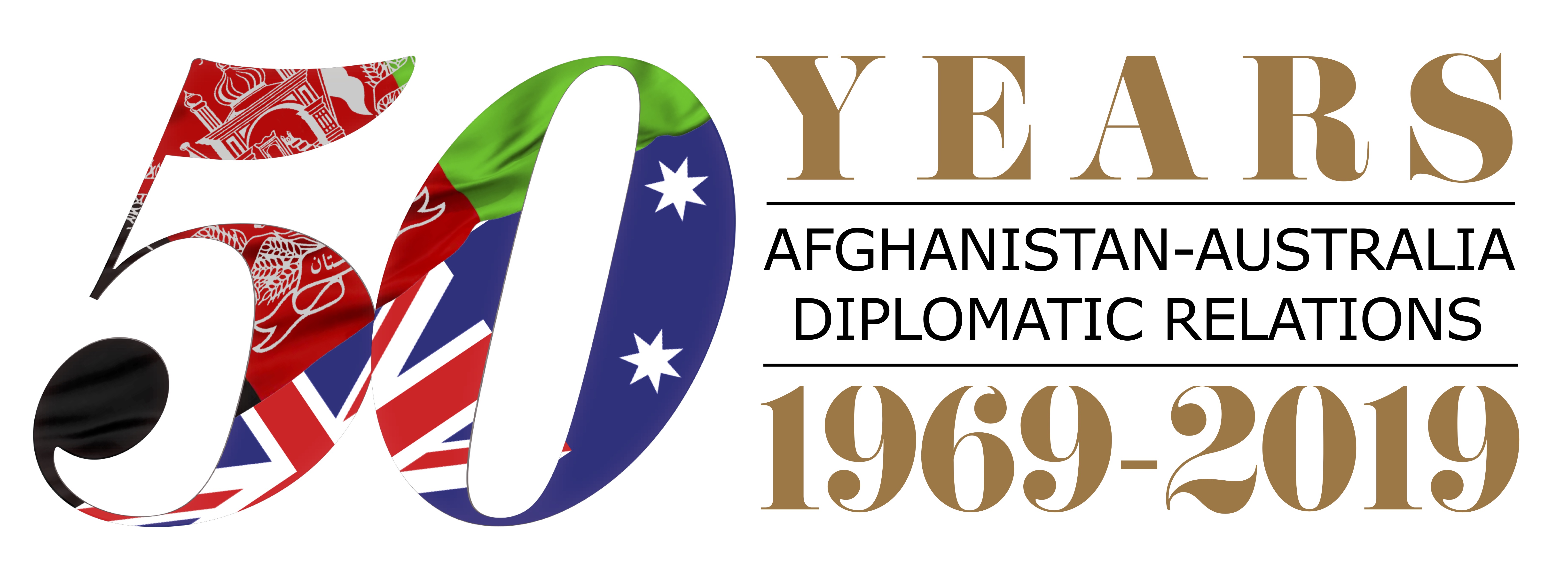

The Second Annual People-to-People Dialogue was held between Australia and Afghanistan from 6th to 14th of March, with the central theme being Women’s Empowerment. As part of this, a delegation of nine talented Afghan women representing a range of professional backgrounds visited Canberra, Sydney and Melbourne. These visits allowed the delegation to engage with a variety of government bodies, think-tanks, universities and diaspora communities. The visit also allowed the Delegation to celebrate International Women’s Day with the Embassy and its staff and friends.
The aim and outcome of the Dialogue was to highlight women’s contributions and involvement across various sectors, as well as the visions, roles and challenges of Afghan women in the peace negotiations and post-reconciliation era. At each of the diverse visits, which included the NSW Chamber of Commerce, DFAT, ACFID and the Governor of NSW, the delegates spoke about their personal experiences and the successes and challenges of women in each of the represented fields. The delegation also had an opportunity to engage in cultural activities and learn about the Indigenous heritage of Australia, as well as the diverse multicultural society it is home to today.
The Embassy would like to extend its sincere thanks to the Department of Foreign Affairs for its cooperation in planning and running the Dialogue, and also to each of the bodies in all three cities for their hospitality in hosting the delegates and engaging in the process of sharing and learning, which is so central to the strength of the Australian-Afghanistan bilateral relationship.
For more information and to follow updates of the visit, please visit the official Facebook, Instagram and Twitter accounts and follow #AusAfghanDialogue.
The Embassy of the Islamic Republic of Afghanistan – Canberra, Australia extends its sincere thoughts and condolences to the family and friends of victims, the people and the Government of New Zealand following the Christchurch terrorist attacks.
In this tragic incident, 50 are killed and 50 more are injured. As of last night, 21 victims have been identified by local authorities and are available for release to their families. A total of 27 victims are expected to be identified by tonight.
Over the past week, President Mohammad Ashraf Ghani spoke and extended his deepest condolences to the families of Haji Mohammad Daud Nabil and Matiullah Safi who were martyred during the Christchurch terrorist attack. Ambassador Waissi arrived in Christchurch to pay tribute to the victims and visit hospitalised patients of New Zealand Afghans and other nationalities who were critically injured.
Despite the seriousness of their injuries, the health situation of three Afghans is improving.
In Australia, Ambassador Waissi and representatives of the embassy joined in sharing sympathies with the affected men and women of New Zealand through memorial vigils held at the Canberra Islamic Centre and Nara Canberra Park.
Afghanistan is extremely humbled by the demonstration of camaraderie everyone has shown and joins the world in supporting New Zealand through the darkest of days.
As this is a critical time, requiring all of us to stand together in sympathy, solidarity and harmony, the Embassy has decided to cancel the Nowruz celebrations (Solar New Year 1398), which were scheduled on Thursday, 21stMarch 2019.
Ambassador Waissi and representatives of the embassy will continue to provide emergency support to Afghan nationals affected by this tragic event.
Kei Konā te aroha me te whakaaro -- Kia kaha
2019 marks an exciting year for the Embassy of Afghanistan in Canberra, and as the year progresses, each month brings with it an important event. Quickly approaching in March is the Annual People-to-People Dialogue; a platform which works to enhance sustainable and productive relationships between Afghanistan and Australia. The Dialogue is returning for its second year and will be focussing on Women’s Empowerment. As part of this, a delegation of Afghan women leaders representing a variety of backgrounds will be visiting Australia, and plan to be in Canberra, Sydney and Melbourne from the 6th to 14th of March.
During the course of their visit, the Delegation will be meeting with various government organisations, councils, diaspora groups and others with the aim of highlighting women’s contributions and involvement across different sectors. They will be discussing the Afghan current affairs and the visions, roles and challenges for Afghan women in their country’s post-reconciliation era. The Delegation will also participate in International Women’s Day on the 8th of March, which marks an valuable opportunity to draw attention to the achievements of Afghan women on a bilateral level.
The focus on Women’s Empowerment in this year’s Dialogue reflects the important role that women play in strengthening the people-to-people bonds between Australia and Afghanistan, and is especially timely given the 50th anniversary of bilateral relations between our two nations. The prospective agenda will include issues of importance for Afghan women and potential solutions, and Australia’s relationship with these initiatives. The Dialogue also hopes to raise awareness on shared concerns faced by women in both countries, and current initiatives being taken to combat these – particularly in the delegates’ respective fields. The Dialogue will be a platform to examine the expectations and goals of women as we move forwards in the post-reconciliation era.
For more updates and to follow their activities in Australia, follow #AusAfghanDialogue through our Facebook, Twitter and Instagram.
Fashions of Multicultural Australia (FOMA) is called as a first-ever national initiative that will generate trade opportunities and foster social cohesion through the universally binding industry that is fashion. Supported by the Australia - Korea Foundation, Department of Foreign Affairs and Trade, FOMA will demonstrate the origins of Australian fashion and how migration has historically affected.
The Embassy of Islamic Republic of Afghanistan in Canberra has the previliage of being part of 2019 FOMA in Sydney and display Afghan culture and its diversity to Australia.
In 2019, Fashions of Multicultural Australia attendees can expect to see a diverse showcase of International, Indigenous Australian, Migrant, and Refugee designers as they converge and collaborate on stage at a venue of great cultural significance. It is expected to have over 3000 communities from across the nation at FOMA.
For more information, please visit here.
Ambassador of Islamic Republic of Afghanistan, HE Wahidullah Waissi, called on His Excellency General The Honourable David Hurley AC DSC ( Ret'd) Governor of New South Wales on Friday 15 February at his office in Sydney. Ambassador Waissi extends best wishes of His Excellency Mohammad Ashraf Ghani, President of Islamic Republic of Afghanistan on Mr. Hurley's appointment as the new Governor-General of the Commonwealth of Australia.
Ambassador Waissi has also discussed enhancing bilateral cooperation between two countries. HE Mr Hurley's appointment as the new Governor-General coincides with the 50th Anniversary of Australian-Afghan Diplomatic Relations. The first non-resident Ambassador of Australia has presented his credentials to the Government of Afghanistan in March 1969. Embassy of Islamic Republic of Afghanistan has developed number of activities and events to commomorate the 50th Anniversary and engage people to people contacts.
The Governor of NSW has extended his support to the Anniversary and enhancing cooperation between two nations.
On Saturday the 16thof February, the Embassy of Afghanistan hosted a stall at the National Multicultural Festival, with the assistance of the Embassy staff, families and Afghan community members from Sydney and Canberra. This was the second consecutive year the Embassy held a stall, and it showed to have grown in popularity.
The samples of dry fruits and saffron tea were very popular, with over 5000 visitors coming to try them, and many of these visitors left messages for Afghanistan on the interactive canvas. The event was also successful for children, who were able to collect Afghanistan flag stickers and try different types of dry fruits. There were displays of tradition clothing, jewellery and traditional instruments courtesy of Afghan community members, whom the Embassy thanks for their assistance and participation.
Thank you to all those who visited the stall and learnt something about Afghan or reconnected with fellow Afghans, and to all who contributed to the event. The Embassy looks forward to returning to the Multicultural Festival next year.
To view pictures from the day, please visit our Facebook page or click here.


